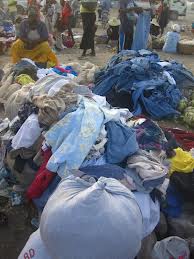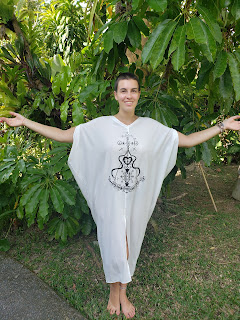Made in Haiti, Dumped in Haiti
This is an article I posted a couple of years ago when I first made it back to Haiti.
Since this past month the focus have been on The True Cost Documentary so I am re-posting this which I think is a great article on the impact of used clothes in Haiti.
In Haiti, people wear T-shirts bearing unlikely English messages: “We’re the 2% who don’t care,” says one; a respectable-looking grandmother dons a T-shirt emblazoned with “Crack is Whack!”; a little boy without shoes or pants wears a “Save Darfur” T-shirt; while training an illegal militia, a tough former army lieutenant sports a “Varsity Cheerleader” T-shirt.
The absurd messages on these garments—by-products of globalization—are often lost in translation for Haitians, but the crueler irony is that decades of neo-liberal measures have pushed Haiti to expand its apparel industry to export T-shirts to US markets.
Garments are then branded with various designs, sold, consumed, discarded, and shipped back to Haiti, along with other used clothes, for resale in local markets, undercutting and decimating Haitian tailors and their trade in traditional-style clothing.
These days, demand for Haitian-style clothing designs has been reduced to uniforms, church clothes or cultural dresses/shirts for those practicing Vodou.
“Professional tailors who do haute couture are disappearing from the country,” says Daomed Daniel, a tailor who has run his own shop in Cité Soleil for 30 years. Daniel says he used to have full-time work, but the expansion of the used-clothing market, locally known as pepe or contrebande because it is often smuggled and dumped illegally, has forced him to live mainly on commissions earned by making children’s school uniforms.
Members of the Association des Tailleurs et Couturiers de Port-au-Prince (ATCP), a network of independent tailors operating out of houses around Carrefour, complain they can’t compete with the excess of garments made in China, Honduras, and Bangladesh that are then dumped, second-hand, in Haiti. But tailors willing to work in the export garment-assembly sector have to do just that.
In a 2009 report, Oxford economist Paul Collier argued that Haiti’s poverty and deregulated labour market made it “fully competitive with China, which is the global benchmark.” Haiti’s poverty and low minimum wage make it an appealing competitor in the global commodity chain, and it is also conveniently located at the doorstep of North America.
After the devastating earthquake in Haiti in 2010, the international community pledged an unprecedented $5 billion—at the time, the largest pot of post-disaster reconstruction money ever pledged. However, the centerpiece of this post-earthquake reconstruction fund was not the creation of jobs, rebuilding of houses, nor the construction of water and sanitation infrastructure to prevent the spread of and death from the worst cholera epidemic in modern history, but rather to build a giant, Korean-run, $300 million industrial park for apparel manufacture in Caracol, far away from the earthquake-affected area and at the heart of an environmentally protected region, which is also home to some of the most fertile agricultural land in Haiti.
In a market driven by the profit-making of multinationals, the garment sector isn’t about creating jobs for Haitians so much as displacing jobs from one poor country to another, poorer one, making Haiti’s poverty its “comparative advantage.” The Korean clothing giant Sae-A, which produces for Walmart, Target, and Gap, has been accused of anti-union repression, including “acts of violence and intimidation” in Guatemala and, more recently, in Nicaragua. It closed its operations in Guatemala due to union disputes, before setting up shop in Caracol, Haiti. Richard Lavallée, Better Work Haiti’s program manager, says Better Work managers in Nicaragua hear from their producers that “Haiti is a real threat….When we speak to producers in Haiti, it’s El Salvador, it’s Nicaragua that poses a threat. So, there’s no doubt they watch each other and are in competition.”
In early February 2013, a Haitian workers’ union, Batay Ouvriye, reported that Leo Vedél, a worker at the Premium Apparel assembly plant in Port-au-Prince, which subcontracts exclusively to Montreal apparel company Gildan, was assaulted and then fired when he demanded he be paid the legal minimum wage.
Gildan is the leading producer of blank T-shirts for the North American market and has subcontracted to manufacturers in Haiti for a decade. Geneviève Gosselin, Gildan’s corporate communications director, told The Dominion she hadn’t heard of the new minimum-wage law, nor of Better Work’s latest findings. “Our company is committed to respecting labour rights and international labour standards,” she said, but “the way the law is drafted creates confusion locally [and has] never been clarified by the appropriate authorities.”
When the Haitian labour minister’s assistant director, Marie-France Mondesire, was asked by The Dominion why so few companies in the export garment sector respect the new minimum-wage law, she replied, “That’s your interpretation of the law,” and hung up the phone.
In contrast, speaking at a press conference on April 29, Haitian Labour Minister Charles Jean Jacques said, “Significant strides have been made in the implementation of the law on the minimum wage,” citing Better Work’s finding that 16 per cent of workers in the outsourcing sector now earn the minimum wage.
“The minister has either not understood the report or is not telling the truth,” said Yannick Etienne, Batay Ouvriye’s lead national coordinator, speaking with The Dominion from a May Day march in Ouanaminthe, the free-trade assembly zone in northern Haiti.
“It’s a regression,” said Etienne, pointing out that 90 per cent of workers should be earning the new minimum wage. In a country with an unemployment rate estimated between 40 and 80 per cent, Etienne says that workers are so desperate that they tolerate the breach of minimum-wage law.
Sources:
Isabeau Doucet is a freelance journalist, TV producer and anthropology MA
http://www.globalresearch.ca/made-in-haiti-dumped-in-haiti-slave-labor-and-the-garment-industry/5342396
http://www.haitian-truth.org/made-in-haiti-dumped-in-haiti-slave-labor-and-the-garment-industry/




Comments